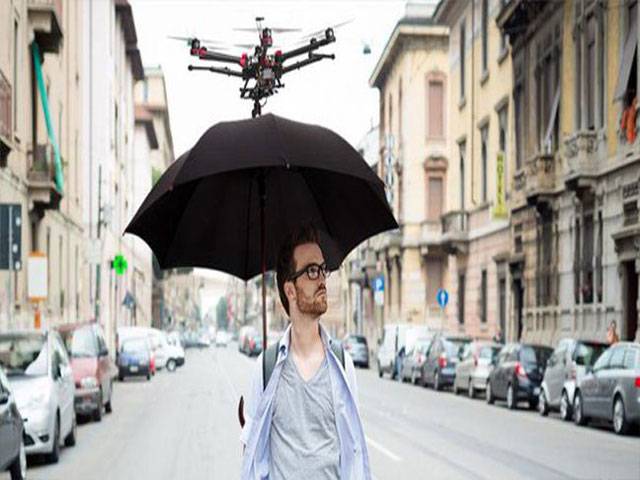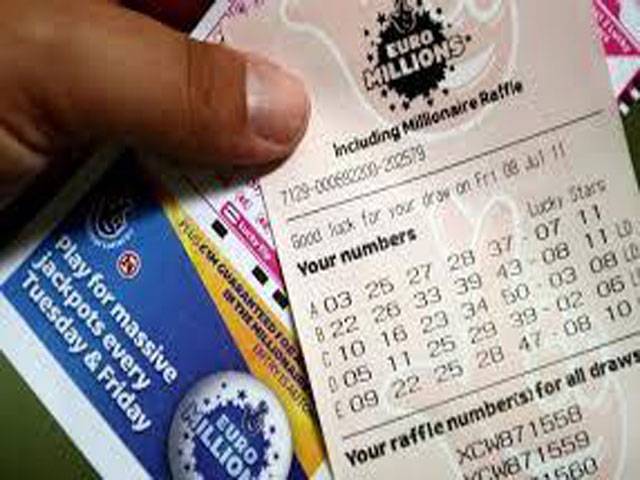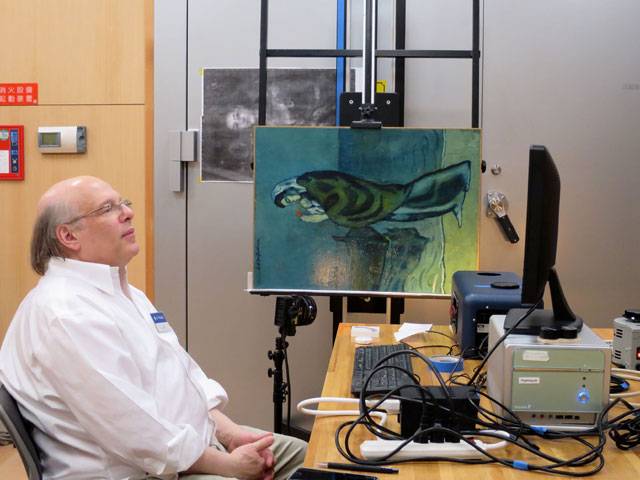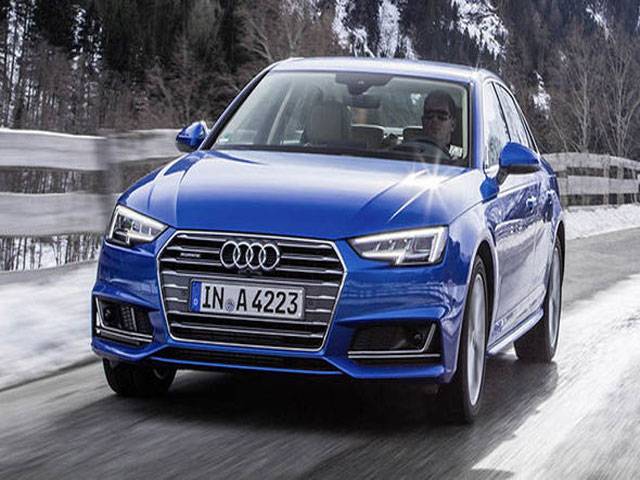‘French Spiderman’ foiled in Seoul skyscraper attempt
SEOUL (AFP): French urban freeclimber Alain Robert attempted to scale the world’s fifth-tallest building Wednesday, getting more than half way up the 123-storey Lotte World Tower in Seoul before security forced him to abandon the ascent. The 55-year-old, dubbed the ‘French Spiderman’, made his way up the building bare-handed and without ropes as staff pursued him from inside. “I climbed about 75 stories and then after that, it was a bit like cat and mouse,” Robert told AFP. “Finally, I decided to surrender.”
He was taken to the rooftop on a maintenance cradle and arrested.
As he awaited processing by police he told AFP his climb was to celebrate the recent peace-making efforts between the two Koreas and he hoped the authorities would take that into account.
“I may get a hefty fine ... but I did it because of what is happening now between South Korea and North Korea,” Robert said.
“That is my way of saying thank you to Kim Jong Un and Moon Jae-in.”
In the last two months the leader of nuclear-armed North Korea has twice met the South’s president, the two men exchanging smiles and hugs after years of heightened tensions.
Robert has scaled more than 100 structures without ropes or other safety equipment, setting a record for “most buildings climbed unassisted” according to Guinness World Records.
His successes include many of the world’s tallest skyscrapers and iconic buildings, such as the Eiffel Tower, the Sydney Opera House, the Petronas Twin Towers in Kuala Lumpur and the Burj Khalifa in Dubai - where he used suction devices and a safety rope as it has no hand or footholds.
Several fire trucks and police were sent to the Seoul building after a security guard spotted the French climber.
“It’s regrettable,” said You In-sik, a spokesman for the Lotte World Tower. “He climbed without permission. It’s dangerous.”
Robert has suffered several severe falls while climbing and estimates his accidents have left him 66 percent disabled. He has been arrested numerous times for his exploits.
Japan ‘drone-brella’ promises hands-free sun cover
TOKYO (AFP): It’s the hands-free experience you never knew you needed - a Japanese company has developed a drone-powered parasol it says can hover over users, protecting them from the sun. The drone-powered sunshade - being developed by Asahi Power Service - should be released next year, and will initially target those in need of a hands-free head covering wider than your average hat, like golfers. The potential headaches posed by crashes, and regulations governing autonomous aircraft, mean the company expects the product will initially be used in closed private spaces, like golf courses.
“I decided to develop it as I don’t like to hold an umbrella,” company president Kenji Suzuki told AFP.
At 150 centimetres (60 inches) wide, the parasol prototype weighs five kilos (11 pounds), and so far can only fly for five minutes on one charge.
Asahi Power Service is hoping to quickly extend flying time to at least 20 minutes, partly by making the device lighter, Suzuki said.
“The first prototype we made was just a drone attached to a regular umbrella,” he said.
“We are now testing the third-generation prototype and trying to overcome (the technological challenges of) hovering in a stable manner above the head of the user and then chasing the user.”
The drones are fitted with cameras that help the parasols track their owners and stay over the correct head.
The company expects the device to have a price tag of about 30,000 yen ($275), a hefty investment for a parasol that isn’t yet able to protect its users from the rain.
For now, the devices are not waterproof. “Eventually, we aim to develop it into an umbrella,” Suzuki said.
Frenchman bags second million-euro lottery win
PARIS (AFP): A Frenchman has won a million euros twice in the last eighteen months on the same lottery, media reported Wednesday, a feat mathematicians said carried odds of around 16 trillion to one. Le Parisien newspaper said the unnamed player, from the eastern Haute-Savoie region, held winning tickets on both 11 November 2016 and May 18 this year through My Million. The lottery is linked to the Euro Millions franchise, which is offered in 12 European countries twice a week and carries enormous jackpots, sometimes worth more than 100 million euros.
French players who buy a Euro Millions ticket get automatically entered into the My Million draw which carries a lower top prize of one million euros ($1.2 million).
Unlike Euro Millions, players cannot choose their numbers for their My Million ticket. They are randomly generated instead.
Le Parisien quoted mathematicians as saying the odds of winning My Million was around 19 million to one while the harder to win Euro Millions was 140 million to one.
The French player’s luck mimics that of an Australian man who last month won a local lottery twice in the same week.
The unidentified man, in his 40s and from the suburb of Bondi, picked up Aus$1,020,487 (US$770,000) and then scooped another Aus$1,457,834 just five days later.
Scans reveal newsprint,
2nd painting under Picasso
TOKYO (AFP): Infrared imaging technology has helped peel back the layers of a Pablo Picasso painting on display in Japan, and revealed a page from a 1902 newspaper and another composition below. US and Japanese researchers scanned the piece “Mother and Child by the Sea”, owned by the Pola Museum of Art, Tokyo, and uncovered a page of the French newspaper Le Journal from Jan 18, 1902. Picasso is thought to have moved to the Spanish city in early Jan 1902, bringing a few canvasses with him, and the newspaper article revealed in the painting suggests the work was completed some time after his move.
The scan also provided clear images of an underlying painting of a woman sitting down next to an absinthe glass with a spoon in it.
Picasso frequently reused canvasses or incorporated previous sketches into a final work.
However, it was not immediately clear why the artist used a page from Le Journal, which he was known to have read frequently.
“It may have been used... to cover previous layers before he painted another layer or the final composition of the mother and child,” scientists said.
The section of newsprint brought readers news of parliamentary clashes in London and the creation of a new annual exhibition of painting and sculpture at the Automobile Club of France, a gentleman’s club in Paris.
Germany orders recall
of 60,000 Audis
FRANKFURT AM MAIN (AFP): Germany this week ordered the recall of tens of thousands of cars produced by Volkswagen subsidiary Audi over “illegal software” designed to conceal levels of harmful emissions, the KBA vehicle licensing authority said Wednesday. “We have ordered that the illegal ‘defeat devices’ uncovered should be removed and the vehicles refitted according to the regulations,” a KBA spokesman told AFP. “Defeat devices” refer to physical or software systems designed to reduce polluting emissions during regulatory tests, while allowing them to rise in real driving conditions.
Around 60,000 Audi A6 and A7 diesel cars in the European Union are affected by the recall, some 33,000 of them in Germany, the firm said.
In early May, Audi said it had stopped delivering some A6 and A7 versions to customers after finding “irregularities” in their onboard software, adding that it was working on a fix.
At the same time, the KBA said it was launching an inquiry into “suspicions of manipulation” in the cars.
News magazine Der Spiegel reported that the suspect software related to AdBlue, a fluid injected into the exhaust system to neutralise harmful nitrogen oxides (NOx).
The program reduced the amount of the liquid sprayed into the catalytic converter, aiming to lower consumption in between check-ups on the cars - but allowing for higher emissions of the polluting gases.
German authorities warned Mercedes-Benz parent Daimler and Audi owner Volkswagen earlier this year that they could face mass recalls after similar AdBlue trickery was uncovered.
Meanwhile, prosecutors searched homes and offices belonging to Audi employees in Germany in February and in April.
Volkswagen’s high-end subsidiary has long been in the focus of the “dieselgate” scandal, in which the Wolfsburg-based behemoth admitted in 2015 to installing software designed to dupe regulatory emissions tests in 11 million diesel-fuelled cars around the world.
Some vehicles’ NOx emissions were up to 40 times higher than legal limits.
The scandal has already cost VW more than $25 billion (21 billion euros) in fines, compensation and buybacks, mainly in the United States.










